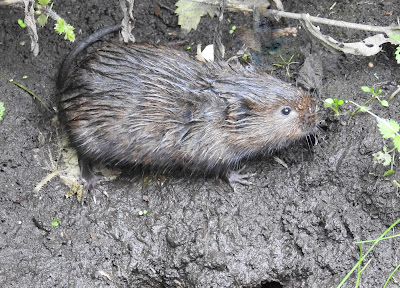Below: plenty of water vole droppings.
A burrow that's clearly occupied.
As I've said, this time of year the voles go suddenly very shy; I don't know if it's to do with populations thinning out as young disperse, but it happens almost overnight and, for the dedicated vole-watcher, it's unnerving. When you were used to seeing several voles a day and then you're down to nothing, how do you know they haven't all packed up and gone, or been wiped out?
Because the signs are all still there. The daily fresh droppings, nibbled vegetation, the visibly-in-use burrows, the mysterious clouds of mud that bloom as a nervous vole shoots past under water. And there are plopping noises, and violent ripples, and sometimes the sound of roots being crunched under your feet. So it's a matter of keeping the faith, till their collective psyche becomes more confident again and you start getting sightings once more.









1 comment:
Muddy vole that is!
Post a Comment